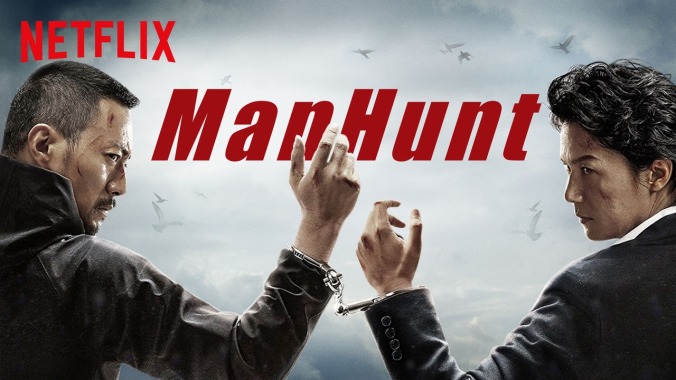The man, a high-powered corporate attorney named Du Qiu (Zhang Hanyu), luckily gets out of the bar before the shooting begins—a brief, messy sequence that looks more like a bad imitation than genuine John Woo, leading one to believe that the pistol-opera auteur has totally lost his touch. Fortunately, this isn’t true, because when Manhunt gets to its actual action scenes, it delivers with aplomb the kinetically choreographed decadence that has been Woo’s forte since the 1980s. But for a time, the movie seems to be outpaced by its own cartoon logic and convoluted “wrong man” setup, in which Du Qiu is framed for murder and goes on the run to clear his name, à la The Fugitive’s Richard Kimble, with the hotshot local cop, Yamura (Masaharu Fukuyama), in close pursuit. It involves, among other things, a sinister Japanese pharmaceutical company; a secret lab where homeless people are turned into bloodthirsty super-soldiers; a mystery woman (Qi Wei) with a blood-spattered wedding dress; the aforementioned hitwoman, Dawn (Ha Ji-won), and her partner, Rain (Angeles Woo, the director’s daughter).
That the plot is secondary and self-parodying is both the point and the problem. Its raison d’être is the breathless, irreverent delivery of familiar Woo-isms, at one point literally crashing into a coop of the director’s trademark white doves. It’s clear that Woo is rethinking some things—mostly by introducing more female characters than Manhunt actually knows what to do with. (Next on his slate: a remake of The Killer with Lupita Nyong’o in the Chow Yun-fat role.) But the level of self-reference and fan service (including what sounds like a dig at the running times of Woo’s more recent historical epics, Red Cliff and The Crossing) inspires about as much confidence as the occasionally textureless, amateurish expository filmmaking. No one in the film could be accused of giving an interesting (or even credible) performance, and long stretches of tin-eared English dialogue add an extra distancing effect to the already ludicrous proceedings. And yet, even in its clumsiest stretches, Manhunt is fast-paced and fun, which might be the only metric that matters.
One indication of Manhunt’s level of action-movie camp is the fact that it comes tantalizingly close to bringing the showdown of “technology versus horse” envisioned by Adaptation’s Donald Kaufman to screen. Another is that includes that chestnut of ’90 action flicks: the jet ski chase. It’s overtly a throwback to the genre’s heyday on both sides of the Pacific, complete with a steel-drum-and-sax score that’s one part Hong Kong genre Muzak and one part Commando, plus lots of close-quarters pyrotechnics. When it comes to mayhem, Woo is still comfortably a master, as evidenced by a window-shattering, banister-splintering farmhouse battle royal that includes killers on motorcycles and a spoof of the “John Woo style” maneuver (sliding balletically, a gun in each hand) performed by two men handcuffed together, diving as one.
But even the more intriguing moments of visual melodrama—a gothically romantic slow-motion car crash, an old-fashioned dissolve that turns a puddle of blood into the wine in a tycoon’s glass—are offset by Manhunt’s sense of ironic nostalgia. With every overblown character introduction and goofy twist, it announces itself as intentionally cheesy guilty pleasure. With Woo, one expects a higher, more transcendent grade of cheese.


 Keep scrolling for more great stories from A.V. Club.
Keep scrolling for more great stories from A.V. Club.